The Chronicles of Narnia: The Lion, the Witch, and the Wardrobe
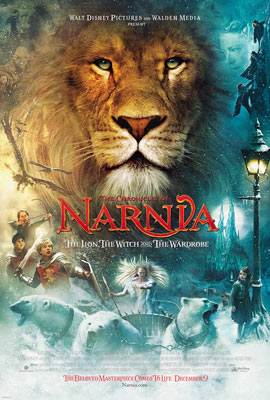
Set during the dark days of England during World War II, the four Pevensie children are sent away to live with a guardian so they can avoid the city bombings. The four siblings, including eldest Peter (William Moseley), logical Susan (Anna Popplewell), difficult Edmund (Skander Keynes), and youngest child Lucy (Georgie Henley) enter the massive mansion of the Professor (Jim Broadbent), who will watch over them, with mixed feelings. They are away from their home and everything they love for the first time, and reports on the radio speak of the war intensifying. The children try to lighten the dour mood of the stuffy mansion with games, including a fateful session of Hide and Seek, which sends little Lucy searching desperately for a place to hide. Stepping within an ancient wardrobe in an abandoned room, she discovers that it is actually a doorway to the fantasy world of Narnia - a world locked in eternal winter, and under the iron fisted control of the cruel and manipulative White Witch (Tilda Swinton from Constantine).
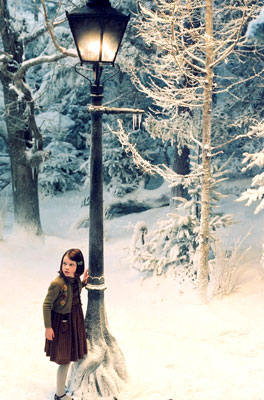 Lucy befriends one of the local creatures - a "fawn" called Tumnus (James McAvoy). After her brief encounter, she returns home by returning through the wardrobe, only to find that time on Earth has seemingly stopped the entire time she was in Narnia, and she's exactly where she was when she left. The other three children are doubtful of Lucy's tales of a fantasy world located just beyond a wardrobe, but soon come to discover the world for their own when they too are forced to hide within the wardrobe after an accident in the mansion occurs. The Pevensie siblings are rightfully awed by the splendor of Narnia, but as they begin to meet the local animals and creatures, they learn of a much greater purpose to their visit, and a prophecy that they are supposed to fulfill. It seems that these children from another world are fated to join forces with the legendary lion, Aslan (voice by Liam Neeson) - the rightful ruler of Narnia, and end the 100-year long reign of the evil White Witch. But, with the Witch attempting to manipulate young Edmund into taking sides with her, the prophecy may not be fulfilled, and Narnia may never return to its rightful form.
Lucy befriends one of the local creatures - a "fawn" called Tumnus (James McAvoy). After her brief encounter, she returns home by returning through the wardrobe, only to find that time on Earth has seemingly stopped the entire time she was in Narnia, and she's exactly where she was when she left. The other three children are doubtful of Lucy's tales of a fantasy world located just beyond a wardrobe, but soon come to discover the world for their own when they too are forced to hide within the wardrobe after an accident in the mansion occurs. The Pevensie siblings are rightfully awed by the splendor of Narnia, but as they begin to meet the local animals and creatures, they learn of a much greater purpose to their visit, and a prophecy that they are supposed to fulfill. It seems that these children from another world are fated to join forces with the legendary lion, Aslan (voice by Liam Neeson) - the rightful ruler of Narnia, and end the 100-year long reign of the evil White Witch. But, with the Witch attempting to manipulate young Edmund into taking sides with her, the prophecy may not be fulfilled, and Narnia may never return to its rightful form.It has been quite some time since I read the novel upon which this film is based. Yet, immediately as the movie started, I started to remember why the story worked for me as a child. There is a sense of mystery and wonder to Narnia, especially during the early scenes. The film wisely never explains how a wardrobe can act as a gateway to another world, as any explanation would probably leave the audience rolling their eyes. The first half of the film plays upon the nature of discovery and adventure that is within any and all children, and this is why I think the story has endeared for so long. The film is able to capture this perfectly. It has an appropriately innocent, yet somewhat foreboding tone that is needed to set up the story. When Lucy first sets foot into the frozen land of Narnia, there is beauty, and yet an uneasiness. The uneasiness takes a stronger hold as we learn more about the situation of the land, yet the film wisely never makes Narnia an overly dire or serious place. This is a land that any child (or any person with a sense of wonder) would love to visit.
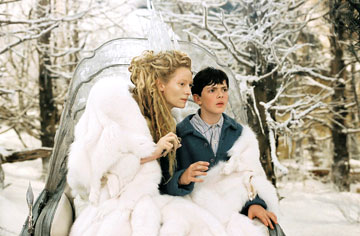 And yet, Narnia is also a world of danger, and I applaud the filmmakers for not flinching away from the darker side of the world. Numerous acts of violence are depicted - everything from child abuse to casualties of war. It is all done very tastefully, however, and never becomes overbearing or frightening. The makers of this film understand that the best children's stories have a dark edge to them. They do not talk down to children and allow them to become entranced in the tale being told and the world the story and its characters inhabit. The film constantly walks a fine line between light-hearted whimsy, and deadly seriousness. Fortunately, it is able to find a tone that is consistent, so the change in mood does not seem sudden or forced. For this, I commend director Andrew Adamson and the 4 screenwriters credited to the script. However, for all it does right, Narnia also does many things wrong.
And yet, Narnia is also a world of danger, and I applaud the filmmakers for not flinching away from the darker side of the world. Numerous acts of violence are depicted - everything from child abuse to casualties of war. It is all done very tastefully, however, and never becomes overbearing or frightening. The makers of this film understand that the best children's stories have a dark edge to them. They do not talk down to children and allow them to become entranced in the tale being told and the world the story and its characters inhabit. The film constantly walks a fine line between light-hearted whimsy, and deadly seriousness. Fortunately, it is able to find a tone that is consistent, so the change in mood does not seem sudden or forced. For this, I commend director Andrew Adamson and the 4 screenwriters credited to the script. However, for all it does right, Narnia also does many things wrong.As I mentioned earlier, we seem to get to see precious little of the world of Narnia. This is not exactly the filmmakers' fault, as the movie is very faithful to the original source material, but it bothered me then, and it bothers me now. At one point, the camera pans over a map of the world, and I really wish we could have seen some of those places that the camera was whizzing by. We also mainly only get to look at forests and fields the entire time, very few places that could not exist in our world. Aside from a couple brief glimpses at the White Witch's palace, a different castle near the end, and the home of some friendly beavers, the settings of Narnia are depressingly mundane, and well, ordinary. When I watch a fantasy film, I want sights I could never see in this world. When a film only offers us forest and field settings, it kind of feels like a cop out. There is also a depressing lack of drama to the storytelling due to the fact that there never seems to be any danger. Oh sure, the story fools us into thinking that the lives of the characters are in jeopardy, but as we learn while we watch the film, death is not permanent in Narnia as long as you have the right tools at your disposal and the right knowledge. It kind of lessens the drama to know that the heroes can constantly escape death due to the fact that they have a life-restoring mystical lion, and a magical healing potion constantly on hand. It kind of gives the feeling that there can never be any true casualties for the side of good, only evil.
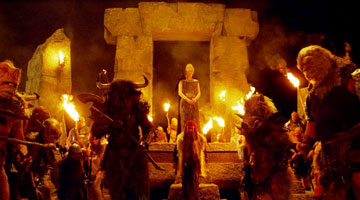 And although the special effects are obviously of the highest quality, they still never seemed quite convincing enough for me. Some characters more than others. The make up effects for the human actors playing half-humans and other monsters is stunning and very believable, but whenever the children were interacting with a CGI animal (like the friendly beaver couple, or a fox), they seemed more like computer animated cartoon characters inserted into a live action movie. The design for the animals is realistic, but there is just something not right or natural about their appearance. It's like the animators tried to give the animals more emotive faces to make them seem more human. I can understand this in a way, but at the same time, it makes the animals seem less convincing. The design for Aslan, however, is excellent, and seems to be the most "real" of all the CGI animals. Perhaps because he acts the most like an actual lion that can talk, instead of an animal imitating a human like a lot of the other creatures.
And although the special effects are obviously of the highest quality, they still never seemed quite convincing enough for me. Some characters more than others. The make up effects for the human actors playing half-humans and other monsters is stunning and very believable, but whenever the children were interacting with a CGI animal (like the friendly beaver couple, or a fox), they seemed more like computer animated cartoon characters inserted into a live action movie. The design for the animals is realistic, but there is just something not right or natural about their appearance. It's like the animators tried to give the animals more emotive faces to make them seem more human. I can understand this in a way, but at the same time, it makes the animals seem less convincing. The design for Aslan, however, is excellent, and seems to be the most "real" of all the CGI animals. Perhaps because he acts the most like an actual lion that can talk, instead of an animal imitating a human like a lot of the other creatures.Now, I don't want to stress only the negatives, as there's a lot to be excited about here. The performances are wonderful all across the board, especially the children. Georgie Henley, who plays youngest daughter Lucy, is a real find, as she is able to convey general emotion and give a strong performance for a child so young. Yes, the children are kind of one note in their personalities (Peter is the "brave" one, Susan is the "smart" one, Edmund is the "trouble maker", and Lucy is the "innocent"), but they are each able to make their roles believable. The actors who play the fantasy creatures of Narnia are also able to give real and emotional performances behind layers of make up, and the vocal performances for the animal characters are strong. But, the real highlight is Tilda Swinton as the villainous White Witch. She is, pardon the pun, chilling, and gives one of the best villain performances I've seen this year. She does not have a single light, or humorous moment. She is truly manipulative, evil, and she is able to bring these traits out beautifully in her performance, making a villain that just about anyone can hate.
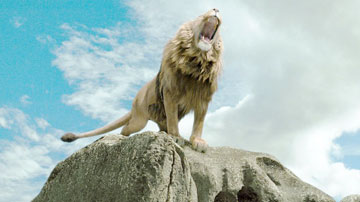
There is no doubt this film will be compared to the Lord of the Rings trilogy, as it shares a similar sense of epic warfare and struggle. Yet, Narnia is able to differentiate itself by offering a wonderful world, and a realistic look at it by having it viewed through the eyes of people from our world, instead of Hobbits and wizards. I just wanted more of it, and for the story to go a bit deeper into the characters. Regardless, Chronicles of Narnia is still a film well worth your time. It may not be the sensation that Disney is hyping it up to be, but it is vastly entertaining, expertly made for the most part, and has a sense of wonder that many films are missing. I liked it. I just didn't love it like I wanted to.
See the movie times in your area or buy the DVD at Amazon.com!






1 Comments:
Well, as I mentioned in my review, Aslan the Lion is computer generated too, and I think he turned out out okay. I think the main reason for this is because he looks and acts like a real lion, unlike the "human" beavers.
By Ryan, at 6:50 AM
Ryan, at 6:50 AM
Post a Comment
<< Home